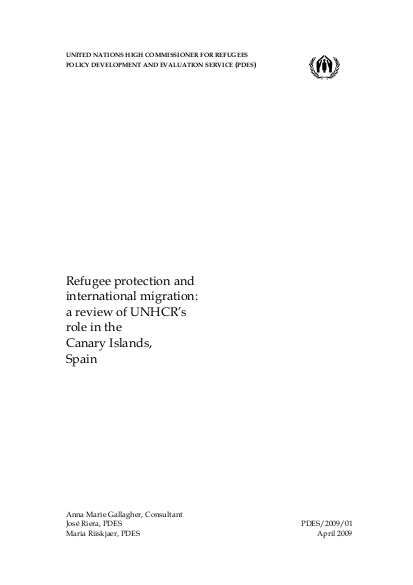
As one of the entry points to the European Union, the Canary Islands have received large numbers of irregular maritime migrants in recent years, more than 30,000 in 2006 alone. As a result of increased enforcement efforts off the coast of West Africa, a significantly lower number of people, some 8,300, arrived in 2008. In addition to reducing the number of migrants entering the Canary Islands, Spain has also been able to return a large number of them as a result of the many readmission agreements which it has concluded with their countries of origin. Concerned by the fact that some of the new arrivals may have protection needs, UNHCR Spain has undertaken a number of activities to assure that they have access to asylum procedures. Such activities are fully consistent with the global policy framework developed by UNHCR and addressed in both the 2002 Agenda for Protection and the more recent 10-Point Plan of Action on Refugee Protection and Mixed Migration. UNHCR does not play an operational role in the Canary Islands, and indeed has no permanent presence there. The Branch Office in Madrid monitors the situation closely, however, and advocates for improved access to asylum procedures and the humane treatment of those people arriving by boat. The review found that UNHCR Spain has been effective in influencing the way that the authorities respond to irregular maritime migration in the Canary Islands. As a result of its monitoring and advocacy activities, the Branch Office has also made progress in addressing protection gaps. It has, for example, been successful in assuring that all those who are held in detention centres receive written information regarding their right to seek asylum. It has also succeeded in facilitating access to these centres by lawyers from the Spanish Commission for Refugee Assistance (CEAR). The capacity of the Branch Office, however, has not been commensurate with the challenges posed by the situation in the Canary Islands. In its response to that situation, UNHCR Spain has developed strong relations with both the central government authorities in Madrid and the local administration in the Canary Islands. With few exceptions, the Branch Office has also established a firm working relationship with relevant NGOs. While UNHCR Spain cooperates effectively with relevant entities at UNHCR Headquarters, coordination between the three regional bureaux with an interest in the Canary Islands - Africa, Europe and MENA - could be strengthened. Despite the undoubted progress that has been made in addressing mixed migrations to the Canary Islands, several protection challenges remain to be addressed, especially the following: • While all new arrivals receive information on their right to seek asylum, many do not adequately understand the information they receive and as a result do not exercise their rights. • There are continued concerns with respect to the accuracy of the procedures used to determine the nationality of new arrivals. • Access to the detention centres by CEAR lawyers is limited and as a result they do not make contact with all potential asylum seekers. • Unaccompanied minors in the Canary Islands are not adequately advised of their right to seek asylum, nor are there adequate procedures in place to identify asylum seekers among this population.